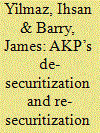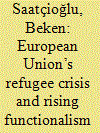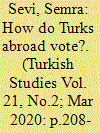|
|
|
Sort Order |
|
|
|
Items / Page
|
|
|
|
|
|
|
| Srl | Item |
| 1 |
ID:
171944


|
|
|
|
|
| Summary/Abstract |
This article evaluates the Turkish state’s relations with the Alevi community through a securitization theory framework. It first examines the issue in its historical context, comparing Kemalist and more recent policies, and highlights that despite the ideological differences between the previous governments and the current AKP government, for Alevis much has remained the same. It then turns to the securitization of the Alevis by successive regimes, and demonstrates that the period of de-securitization begun under the AKP did not end the practice, and that political expedience led to the issue’s re-securitization.
|
|
|
|
|
|
|
|
|
|
|
|
|
|
|
|
| 2 |
ID:
171945


|
|
|
|
|
| Summary/Abstract |
With high interdependence, politicization, and unlikely enlargement, alternative options for EU–Turkey relations beg for consideration. This article argues that, first of all, conceptualization of a new model of EU–Turkey relations must thoroughly account for the evolution of the European project away from uniformity and towards more differentiation as a result of both integration and disintegration pressures. Secondly, an extended model of external differentiated integration has a potential to foster new, more dynamic EU–Turkey relations. However, its practical implementation is constrained by a number of challenges and scope conditions related to preferences and interests of key actors, namely EU institutions, member states and Turkey.
|
|
|
|
|
|
|
|
|
|
|
|
|
|
|
|
| 3 |
ID:
171941


|
|
|
|
|
| Summary/Abstract |
This article investigates the evolving relationship between the European Union (EU) and Turkey following the 2015 refugee crisis. It argues that post-crisis relations have become predominantly functional, measured by strategic EU-Turkey partnership based on interdependence as well as the EU’s relative retreat from political membership conditionality. This is particularly demonstrated by the March 2016 EU-Turkey ‘refugee deal’ whereby functional cooperation deepened amidst material and normative concessions that the EU granted Ankara. The article concludes that although functionalism is set to guide the relations beyond the question of Turkey’s EU accession, a future EU-Turkey external differentiated integration arrangement remains uncertain due to pending challenges.
|
|
|
|
|
|
|
|
|
|
|
|
|
|
|
|
| 4 |
ID:
171943


|
|
|
|
|
| Summary/Abstract |
Voting rights are an essential feature of democratic citizenship. Turkey enfranchised its expatriate citizens in 1995, but they were first granted the right to vote from overseas in the 2014 presidential election. We examine turnout and vote choice among expatriates in Turkish elections from 2014 to 2018. We find that turnout among expatriates is low and that they tend to vote in the same direction as domestic voters. Furthermore, the Justice and Development Party (AKP) and the People’s Democratic Party (HDP) tend to do better among expatriates compared to their domestic counterparts. Our analyses also suggest that expatriate voting is linked to the strength of voters’ ties to their country of origin. Moreover, expatriate vote choice appears to vary with geographic and political variables associated with the host countries.
|
|
|
|
|
|
|
|
|
|
|
|
|
|
|
|
| 5 |
ID:
171946


|
|
|
|
|
| Summary/Abstract |
Since the coup attempt of 2016, bilateral ties between Ankara and Tehran have witnessed a significant boost. Using and refining Steven David’s framework of omni-balancing, which argues that the conduct of foreign policy in Third World settings also takes stock of domestic threats to the regime, this paper explains this emerging rapprochement. The article argues that after 2016, the AKP’s foreign policy became increasingly predicated on regime survival, which was also reflected in Ankara-Tehran ties. This rapprochement was strengthened by both countries’ intersecting positions on the following issues (1) A mutual pro-Qatar stance in the recent Saudi Arabia-Qatar spat, (2) Mutual opposition to a Kurdish state in northern Iraq, and (3) Increasingly troubled relations with the US. Through a careful analysis of Turkish and Persian sources along with official discourses, this paper will expand on these key aspects of these significantly improved bilateral relations between both countries and will conclude with discussion of its durability.
|
|
|
|
|
|
|
|
|
|
|
|
|
|
|
|
| 6 |
ID:
171942


|
|
|
|
|
| Summary/Abstract |
The Workers’ Party (Partido dos Trabalhadores – PT) in Brazil and the Justice and Development Party (Kalkınma ve Adalet Partisi – AKP) in Turkey came to power in 2002 with promises of maintaining economic growth, social justice and political stability. Initially, both governments experienced some success. However, both countries experienced political turmoil as a result of the corruption allegations in the early 2010s. This study compares these cases to analyze what allowed the AKP government to cover up and overcome the corruption allegations whereas the PT government could not. This study concludes that populist characteristics in political strategies of Turkey’s President Erdoğan allowed him to maintain his ruling through suppression of all opposition movements and voices, while Brazilian President Rousseff did not implement the same strategies and consequently lost power.
|
|
|
|
|
|
|
|
|
|
|
|
|
|
|
|
| 7 |
ID:
171947


|
|
|
|
|
| Summary/Abstract |
This article analyzes the transformation of the political position of the Ottoman Armenian community by focusing on the community’s reactions vis-à-vis a major turning point in modern Turkish history: the proclamation of the Republic of Turkey. The article demonstrates how and why the Ottoman Armenian community reacted as it did when the status of the state as a Republic was proclaimed by the Grand National Assembly in October 1923. The major argument the article puts forward is that following the results of the Turkish-Armenian War in the Caucasus, the Greco-Turkish War in Western Anatolia, and the retreat of the French from the Cilicia region, the majority of the Ottoman Armenian community which remained within the borders of ‘New Turkey’ shifted its political position to accommodate the policies of the ruling power in order to protect their physical and cultural existence during this period of political turmoil. Benefiting from primary sources, including Ottoman Armenian and Ottoman Turkish newspapers, archival documents, and parliamentary minutes, this article focuses on the position of Ottoman Armenians following the proclamation of the Republic of Turkey, and thus contributes to the historiography on the Armistice period.
|
|
|
|
|
|
|
|
|
|
|
|
|
|
|
|
|
|
|
|
|